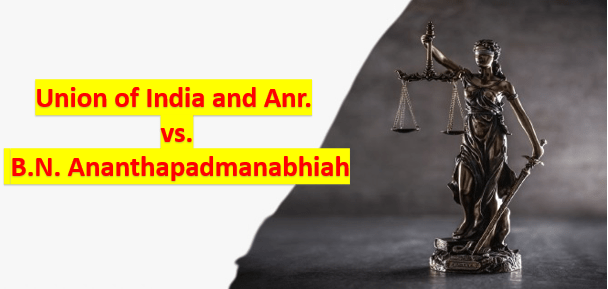
| Case Name | Union of India and Anr. vs. B.N. Ananthapadmanabhiah |
| Equivalent citations | 1971 AIR 1836, 1971 SCR 460 |
| Petitioner | UNION OF INDIA & ANR |
| Respondent | B. N. ANANTI PADMABIAH ETC. |
| Date of Judgement | 22/04/1971 |
| Acts Covered | Code of Criminal Procedure, 1898, Section 429-Difference of view between two high court judges-Referral to third judge-Third judge can deal with entire case and hear additional proofplea. Prevention of Corruption Act, 1947, s. 5A and Code of Criminal Procedure, s. 12-Magistrate’s competence under s. 5A is restricted to the entire India-Magistrate can exercise authority under s. 5A across the district in which he maintains charge but not elsewhere. |
Facts Of the Case –
- Mr. Ananthapadmanabhiah was a Indian Administrative Services [IAS] officer around the suspension of civil servants in india was suspended pending a departmental inquiry initiated against him by the government .Under the suspension order which was issued under article 3[1] of the All India services which states that government allowed to do suspension of a civil servant on the ground of miscount or misbehaviour.
- Further, Mr. Anthapadmanabhiah challenged the constitutionality of rule 3[1] ,contending that it violated his fundamental rights .
Issues Involved –
- All India services of rule 3[1] is violative of the fundamental rights guaranteed under the constitution of India?
- Whether the power of suspension under Rule 3[1] is arbitrary and lacks procedural safeguards ?
- To answer this issue ‘s ,have a look on Arguments presented by both the parties
Contentions of the petitioners –
- 1st Issue – The provision of rule 3[1] Violated article 311 of the constitution of India as this provisio allowed the government to do suspension without any reasonable reasons and also without providing an opportunity for the civil servant to be heard, hence it is violating the principle of natural justice.
- 2nd issue – The applicant stated that the revocation of power afforded by Rule 3(1) was discretionary and vulnerable to unauthorised use. The section failed to set forth any predetermined standards or regulations for the exercise of this authority, resulting in the authority’s arbitrary and arbitrary use of it.
Contention of the respondent –
- 1st issue – The complainant maintained that Rule 3(1), which called for an inquiry from the department subsequent to the expulsion, was in accordance with equitable treatment standards. The expulsion was a measure of safety that ensured an impartial investigation and to preserve the leadership’s trustworthiness.
- 2nd issue- The complainant preserved that the right of termination had to be granted for maintaining the public’s integrity and productivity. Dropping an official pending an investigation allowed the administration to run smoothly and circumvented any improper influence or meddling with material through the probe.
Judgement –
- Supreme court held that suspension under rule 3[1] was a reasonable classification ,it was held on 28 february ,1974 ,it aws also states that civil servants provided with an equal opportunity to present themselves in the court during throughout the probe .
- Further,the Court mentions that suspension of a civil servant was a necessary part to examine the country’s decorum and integrity of the administration .
- The judge acknowledged the capacity of interruption had to be granted for the efficiency of administration and the system’s legitimacy. It highlighted that the utilisation of the authority could be governed by equity and fairness expectations.
Conclusion –
- The verdict in the Union of India and Anr. vs. B.N. Ananthapadmanabhiah et al. (1974) affirmed Rule 3(1) of the All India Services (Discipline and Appeal) Rules, 1955. The Court accepted the need for safeguards such as suspending for preserving the administration’s seamless functioning and preserving the integrity of civil service morale.
- While upholding the revocation of power, the Court of Appeal also underscored the significance of giving legal safeguards and adequate opportunity for civil servants to represent oneself throughout the subsequent administrative examination. This decision accomplishes an appropriate equilibrium between the administration’s priorities and safeguarding of basic rights, supporting transparency and responsibility in civil servant misconduct techniques.
written by Nishtha Tandon intern under legal vidhiya




0 Comments